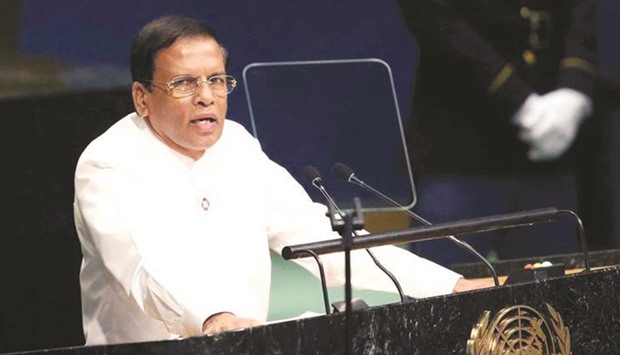Half of Sri Lanka’s public procurement contracts are tainted by bribery and corruption, President Maithripala Sirisena said yesterday, nearly two years after he came to power promising to tackle government graft.
The president, who has ordered investigations into alleged widespread corruption under his predecessor, said he could not name names because those exposed would “go on strike from tomorrow”.
“I regret to say that organised bribery and corruption is still taking place in government institutions,” he told a public meeting of police and anti-corruption activists in Colombo.
“We say call tenders to prevent corruption, but in reality we know that the tender procedures are also corrupt. It happens in over 50% of the time.”
Sirisena said one government institution had threatened to go on strike to protest against the installation of a CCTV system designed to discourage money changing hands illegally.
“Such is the level of resistance and I am told that officers who refuse to cooperate with organised corruption are sidelined and not given any work by their superiors,” he said.
Sirisena swept to power in January last year, ousting the country’s strongman former leader Mahinda Rajapakse.
In recent months he has made several outspoken criticisms of the national unity government under Prime Minister Ranil Wickremesinghe, including accusing top anti-corruption officials of launching politically motivated prosecutions.
The two men are from rival parties, but made common cause to topple Rajapakse, whose entire family and closest associates face allegations of corruption as well as murder.
On Thursday, President Sirisena rescinded a colonial-era British order naming 19 nationals as “traitors” for leading a rebellion nearly 200 years ago, his office said, as he strives to shore up his fading popularity.
Sirisena hailed the ethnic Sinhalese men whole led the insurrection against the island’s British rulers as national heroes, a move some critics were swift to denounce as a political gimmick to bolster his support among the Sinhalese majority.
Sirisena said he had “cancelled the gazette notice issued by then governor of Sri Lanka Robert Brownrigg in 1818 naming the ... Sinhalese leaders as traitors.”
Sirisena’s leadership of the ruling Sri Lanka Freedom Party (SLFP) has been weakened as grassroots supporters shift their loyalties back towards the Indian Ocean island state’s former president Mahinda Rajapakse.
Rajapakse remains popular among the Sinhalese and some of his supporters have formed a new party in the expectation that he will lead it.
Kusal Perera, a political columnist and outspoken government critic, said Thursday’s act was a clear indication Sirisena was now going to cater to the larger Sinhala majority”.
Even so, Perera said, Sirisena was unlikely to win back much support as a result of the announcement.
“Sinhala leaders anyway have been treated as heroes in Sinhala society. This shows how desperate Sirisena is,” Perera said.
Sirisena was a one-time ally of Rajapaksa before he challenged his leadership and won a surprise victory in last year’s presidential vote.
The president, who like Rajapakse is from the majority Buddhist community, has reached out to ethnic minority Tamils and Muslims, upsetting Sinhala leaders.
Sirisena’s government has postponed local council elections by more than a year citing the new electoral process is still not ready.
The 19 Sinhalese leaders launched their revolt in a bid to restore the ruling of Sinhalese kings who exercised power before Portugal’s invasion in 1505.

Maithripala Sirisena: u201cI regret to say that organised bribery and corruption is still taking place in government institutions.u201d
